Olympic watch: Lahiri highlights importance of Olympic medals for India
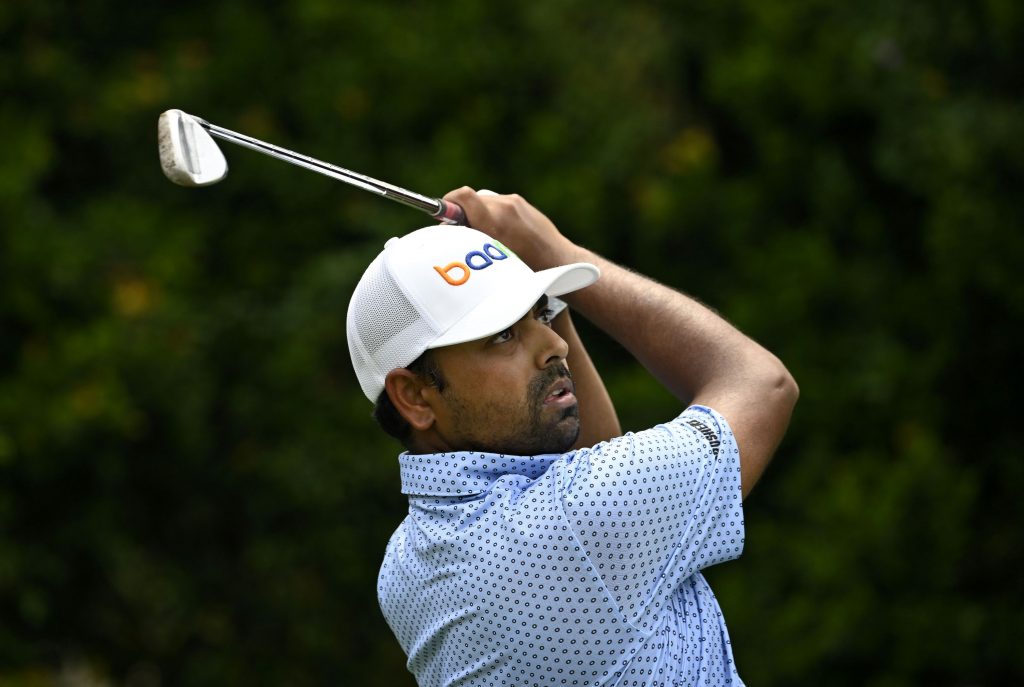
The final list of entrants for the Olympics men’s golf tournament will be confirmed next week, on Monday, June 17. Ahead of that Asian Tour contributor Joy Chakravarty updates us on who is in the running, and spoke to seven-time Asian Tour winner Anirban Lahiri about his Olympic experiences and on not making it through for his third Olympic appearance.
Anirban Lahiri is one of only nine men’s golfers who can call himself a double Olympian. That run for the Indian ace, Asian Tour Order of Merit champion in 2015, is about to come to an end despite his intense desire to not just add to that tally, but also to his country’s medals tally at the 2024 Paris Olympics.
With no tournament offering Official World Golf Ranking (OWGR) points until the cut-off date of June 17, Lahiri’s chances are all but over. The only contracted Indian player on LIV Golf, he has no points to show for all his heroics in the League over the past two years – including four runners-up finishes against some of the best players in the world. He has fallen to No519 in the rankings and is behind four Indians – Shubhankar Sharma (218), Gaganjeet Bhullar (254), Veer Ahlawat (412) and Karandeep Kochhar (475) – in the race for a spot in Paris.
“There are a few of us who’ve been fortunate enough to be at both Rio and Tokyo. And once you are part of the Olympics, you always want to be there again and again,” said the 36-year-old.
“Being in Paris was definitely one of my goals at the start of the year and it does become a task when you’re not playing for a lot of our ranking points. I have also been a bit unlucky with my health. I wanted to play the International Series Macau presented by Wynn, but had to pull out as I wasn’t well. I then carried that sickness and had a terrible Hero Indian Open and missed the cut.
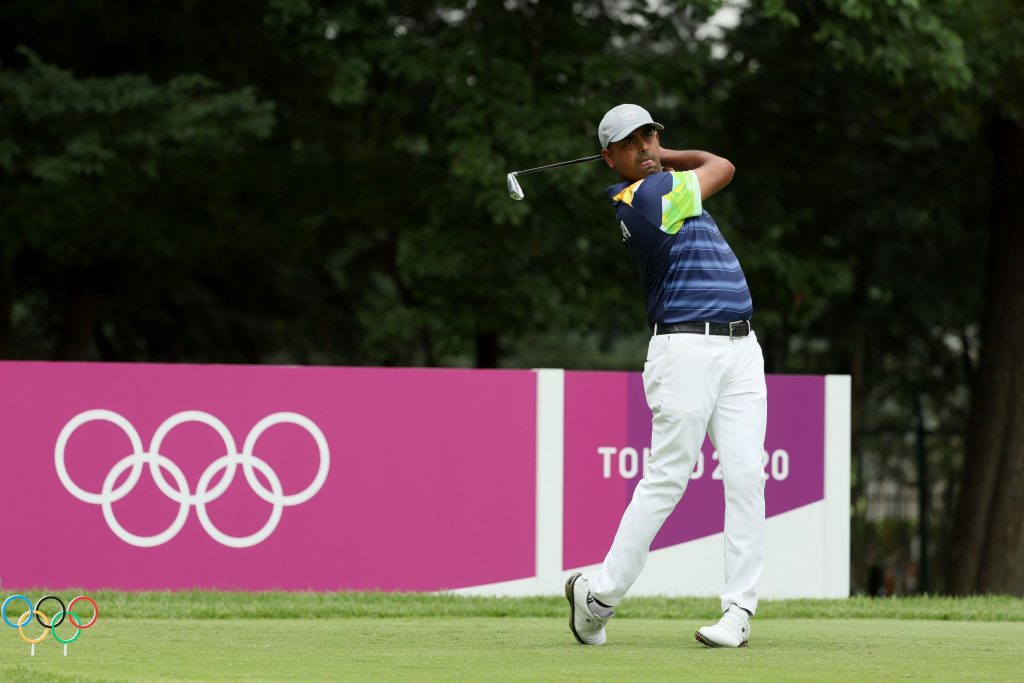
Lahiri at the Tokyo Olympics. Picture by Mike Ehrmann/Getty Images.
“So, there wasn’t really a lot of opportunities, but still enough for me to kind of make a jump. But I did not play my best golf in the weeks that counted.”
Men’s Olympic golf is limited to a field of 60, with qualifications based on the OWGR. The top-15 players are automatically eligible, but the number is limited to a maximum of four golfers from a single country. Thereafter, the Olympic Golf Rankings (OGR) come into play and a maximum of top two players are eligible per country.
The current OGR (as of June 11) is led by world No1 Scottie Scheffler from the United States. Three other Americans, Xander Schauffele, Wyndham Clark, and Collin Morikawa, are ranked inside the top-15 and currently holding qualification places. Schauffele won the gold medal at Tokyo 2020.
There are a total of 13 Asian players from seven countries – China, India, Japan, Korea, Malaysia, Thailand and Chinese Taipei – that are currently inside the qualification line, including Sharma, Bhullar, Thailand’s Kiradech Aphibarnrat and Phachara Kongwatmai and Malaysian Gavin Green.
The men’s event is scheduled at Le Golf National in the outskirts of Paris from August 1-4.
Apart from the Olympic atmosphere, Lahiri will also miss playing at one of his favourite golf courses – Le Golf National.
“Le Golf National is a golf course that I really liked playing. It’s a ball strikers golf course and I feel I could have challenged for a medal realistically. I think those things matter… the opportunities that you get, if they suit your game style, and you feel comfortable,” said a disappointed Lahiri.
“I played there a couple of times. It’s not a chip-and-putt kind of golf course like Rio was. Tokyo was almost a little too long for me at times. It makes a difference. The Olympics happen once every four years. So, if you feel like the golf course sets up for you, then you feel a little more confident in your ability.”
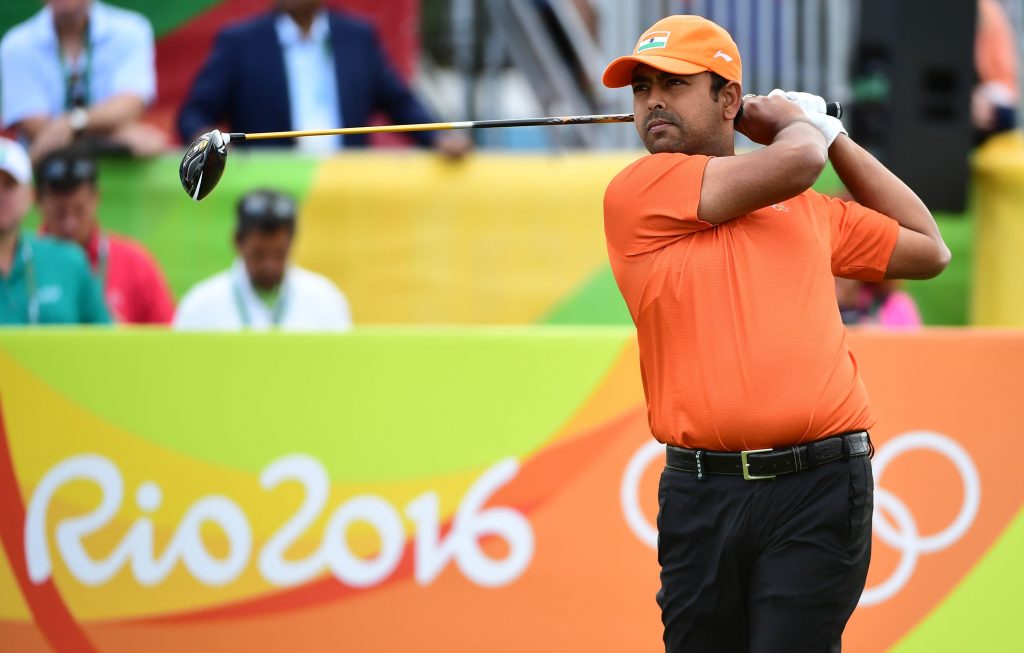
Lahiri tees-off at the Olympics in Rio. Picture by Emmanuel Dunand AFP via Getty Images.
Olympics and India
Lahiri is also very aware what an Olympic medal would mean to India, the world’s most populous nation. In a recent interview, he equated the impact of a podium finish for the people back home to winning a couple of major golf championships.
“It’s just how people look at the Olympics and how they respond to medals. An Olympic medal is not a joke and it’s understandable how difficult it is for someone who’s in track and field to be an Olympic medalist,” explained Lahiri.
“That is not necessarily the case for us golfers. I think a major victory would probably still trump an Olympic medal personally, just looking at the quality of the field and the history, etc. But the Indian population don’t quite understand the nuances of that. Whereas, everybody understands what an Olympic medal is and how it can change the attitude of the government, the people.
“That was one of the main reasons why it was very important for me personally. I wanted to see that change, and be a part of that change.
“We saw quite a massive impact in the whole shooting infrastructure after (Abhinav) Bindra, and before that (Rajyavardhan Singh) Rathore won their medals. Or, what our badminton stars like Pullela Gopichand and PV Sindhu have done. If you look at winning the All England versus an Olympic medal, they will tell you a similar thing to what I’m saying.”
Easy motivation
Swimming legend Michael Phelps is Lahiri’s all-time favourite Olympian, but having experienced being a part of everyone aspiring to climb the Mount Everest of their sport in the last two Games, he has a huge amount of respect for every participant of them who goes through the grind.
“You see all the elite sportspersons in the world, and you just try to soak in the environment. The energy is palpable. Everyone is so focused, almost laser-like. For a lot of these athletes, it’s a culmination of four years of hard work, perseverance, planning and preparation. I greatly appreciate and respect what each one of them must go through.
“Phelps will always be at the top of everyone’s list, just what he’s done, the sheer numbers, the time duration over which he dominated his sport. It’s mind-boggling actually.
“But there is a lot of motivation and inspiration just observing other athletes. You don’t need to meet a Phelps or (Usain) Bolt, to get inspired. You see unknown names, thousands of them, preparing with a similar intensity. Every single one of them has a story that people don’t know, or don’t understand.
“Just meeting these athletes, and hearing the stories that got them there, what they had to overcome on the way, how they did it despite the systems… I used to think I’ve come from nothing, and that’s true in a lot of ways, but I was very fortunate to have been exposed to the game being an army brat. After listening to the stories of some of these athletes, I feel that I’m very fortunate compared to them. It’s very easy to get motivated at the Olympics.”
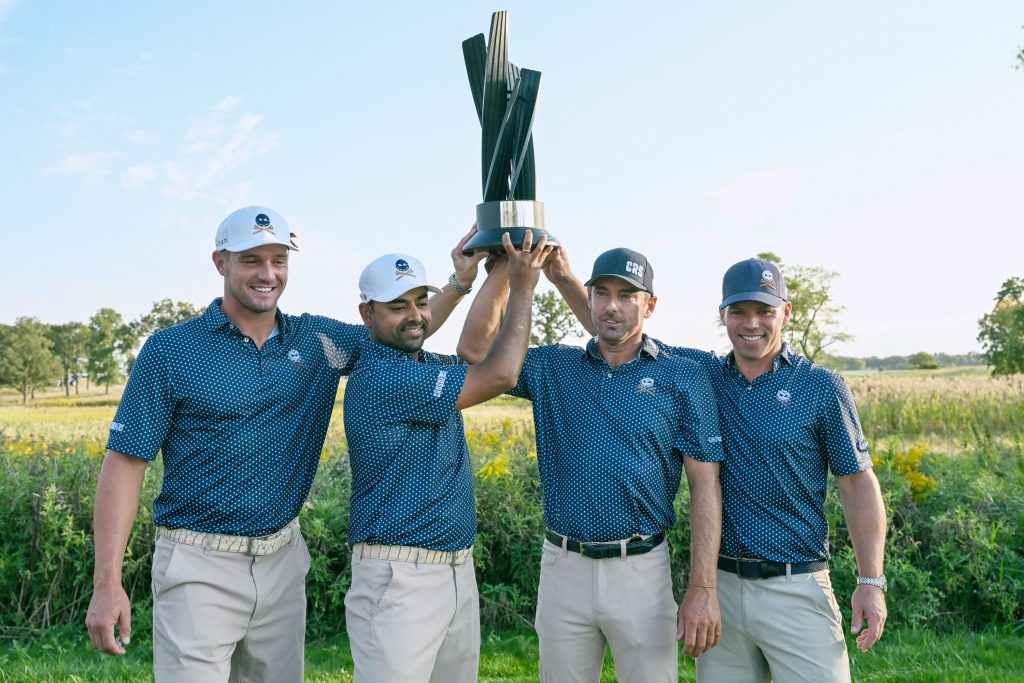
Lahiri has been plying his trade with great success on LIV Golf. Photo by Quinn Harris/Getty Images).
Lahiri does not have any outstanding personal memories of his own participation, but he was full of praise for Aditi Ashok, who led the field on Friday in Rio and heartbreakingly finished one shot outside the medals in Tokyo.
“For me, personally, my golf was substandard. I was injured during Rio and I didn’t play my best in Tokyo. To be quite honest, it was at the end of a five, six-week grind and I ran out of gas. So, there’s not that much that I’ve remembered of my golf,” said Lahiri, who finished 57th in Rio and improved to tied 42nd in Tokyo.
“But from golf’s perspective, seeing how people rallied behind Aditi, and what she did that week, it was a sneak peek into what an Olympic medal can do for Indian golf. She was amazing and got really close in Tokyo. I hope she gets it done this year, because I know she’s a lock for Paris.”

Olympic watch: Lahiri highlights importance of Olympic medals for India
By - simon
[addtoany]

Final list of entrants for the Olympics men’s golf tournament confirmed next week
The final list of entrants for the Olympics men’s golf tournament will be confirmed next week, on Monday, June 17. Ahead of that Asian Tour contributor Joy Chakravarty updates us on who is in the running, and spoke to seven-time Asian Tour winner Anirban Lahiri about his Olympic experiences and on not making it through for his third Olympic appearance.
Anirban Lahiri is one of only nine men’s golfers who can call himself a double Olympian. That run for the Indian ace, Asian Tour Order of Merit champion in 2015, is about to come to an end despite his intense desire to not just add to that tally, but also to his country’s medals tally at the 2024 Paris Olympics.
With no tournament offering Official World Golf Ranking (OWGR) points until the cut-off date of June 17, Lahiri’s chances are all but over. The only contracted Indian player on LIV Golf, he has no points to show for all his heroics in the League over the past two years – including four runners-up finishes against some of the best players in the world. He has fallen to No519 in the rankings and is behind four Indians – Shubhankar Sharma (218), Gaganjeet Bhullar (254), Veer Ahlawat (412) and Karandeep Kochhar (475) – in the race for a spot in Paris.
“There are a few of us who’ve been fortunate enough to be at both Rio and Tokyo. And once you are part of the Olympics, you always want to be there again and again,” said the 36-year-old.
“Being in Paris was definitely one of my goals at the start of the year and it does become a task when you’re not playing for a lot of our ranking points. I have also been a bit unlucky with my health. I wanted to play the International Series Macau presented by Wynn, but had to pull out as I wasn’t well. I then carried that sickness and had a terrible Hero Indian Open and missed the cut.

Lahiri at the Tokyo Olympics. Picture by Mike Ehrmann/Getty Images.
“So, there wasn’t really a lot of opportunities, but still enough for me to kind of make a jump. But I did not play my best golf in the weeks that counted.”
Men’s Olympic golf is limited to a field of 60, with qualifications based on the OWGR. The top-15 players are automatically eligible, but the number is limited to a maximum of four golfers from a single country. Thereafter, the Olympic Golf Rankings (OGR) come into play and a maximum of top two players are eligible per country.
The current OGR (as of June 11) is led by world No1 Scottie Scheffler from the United States. Three other Americans, Xander Schauffele, Wyndham Clark, and Collin Morikawa, are ranked inside the top-15 and currently holding qualification places. Schauffele won the gold medal at Tokyo 2020.
There are a total of 13 Asian players from seven countries – China, India, Japan, Korea, Malaysia, Thailand and Chinese Taipei – that are currently inside the qualification line, including Sharma, Bhullar, Thailand’s Kiradech Aphibarnrat and Phachara Kongwatmai and Malaysian Gavin Green.
The men’s event is scheduled at Le Golf National in the outskirts of Paris from August 1-4.
Apart from the Olympic atmosphere, Lahiri will also miss playing at one of his favourite golf courses – Le Golf National.
“Le Golf National is a golf course that I really liked playing. It’s a ball strikers golf course and I feel I could have challenged for a medal realistically. I think those things matter… the opportunities that you get, if they suit your game style, and you feel comfortable,” said a disappointed Lahiri.
“I played there a couple of times. It’s not a chip-and-putt kind of golf course like Rio was. Tokyo was almost a little too long for me at times. It makes a difference. The Olympics happen once every four years. So, if you feel like the golf course sets up for you, then you feel a little more confident in your ability.”

Lahiri tees-off at the Olympics in Rio. Picture by Emmanuel Dunand AFP via Getty Images.
Olympics and India
Lahiri is also very aware what an Olympic medal would mean to India, the world’s most populous nation. In a recent interview, he equated the impact of a podium finish for the people back home to winning a couple of major golf championships.
“It’s just how people look at the Olympics and how they respond to medals. An Olympic medal is not a joke and it’s understandable how difficult it is for someone who’s in track and field to be an Olympic medalist,” explained Lahiri.
“That is not necessarily the case for us golfers. I think a major victory would probably still trump an Olympic medal personally, just looking at the quality of the field and the history, etc. But the Indian population don’t quite understand the nuances of that. Whereas, everybody understands what an Olympic medal is and how it can change the attitude of the government, the people.
“That was one of the main reasons why it was very important for me personally. I wanted to see that change, and be a part of that change.
“We saw quite a massive impact in the whole shooting infrastructure after (Abhinav) Bindra, and before that (Rajyavardhan Singh) Rathore won their medals. Or, what our badminton stars like Pullela Gopichand and PV Sindhu have done. If you look at winning the All England versus an Olympic medal, they will tell you a similar thing to what I’m saying.”
Easy motivation
Swimming legend Michael Phelps is Lahiri’s all-time favourite Olympian, but having experienced being a part of everyone aspiring to climb the Mount Everest of their sport in the last two Games, he has a huge amount of respect for every participant of them who goes through the grind.
“You see all the elite sportspersons in the world, and you just try to soak in the environment. The energy is palpable. Everyone is so focused, almost laser-like. For a lot of these athletes, it’s a culmination of four years of hard work, perseverance, planning and preparation. I greatly appreciate and respect what each one of them must go through.
“Phelps will always be at the top of everyone’s list, just what he’s done, the sheer numbers, the time duration over which he dominated his sport. It’s mind-boggling actually.
“But there is a lot of motivation and inspiration just observing other athletes. You don’t need to meet a Phelps or (Usain) Bolt, to get inspired. You see unknown names, thousands of them, preparing with a similar intensity. Every single one of them has a story that people don’t know, or don’t understand.
“Just meeting these athletes, and hearing the stories that got them there, what they had to overcome on the way, how they did it despite the systems… I used to think I’ve come from nothing, and that’s true in a lot of ways, but I was very fortunate to have been exposed to the game being an army brat. After listening to the stories of some of these athletes, I feel that I’m very fortunate compared to them. It’s very easy to get motivated at the Olympics.”

Lahiri has been plying his trade with great success on LIV Golf. Photo by Quinn Harris/Getty Images).
Lahiri does not have any outstanding personal memories of his own participation, but he was full of praise for Aditi Ashok, who led the field on Friday in Rio and heartbreakingly finished one shot outside the medals in Tokyo.
“For me, personally, my golf was substandard. I was injured during Rio and I didn’t play my best in Tokyo. To be quite honest, it was at the end of a five, six-week grind and I ran out of gas. So, there’s not that much that I’ve remembered of my golf,” said Lahiri, who finished 57th in Rio and improved to tied 42nd in Tokyo.
“But from golf’s perspective, seeing how people rallied behind Aditi, and what she did that week, it was a sneak peek into what an Olympic medal can do for Indian golf. She was amazing and got really close in Tokyo. I hope she gets it done this year, because I know she’s a lock for Paris.”
Headlines at a glance
- June 2025
- May 2025
- April 2025
- March 2025
- February 2025
- January 2025
- December 2024
- November 2024
- October 2024
- September 2024
- August 2024
- July 2024
- June 2024
- May 2024
- April 2024
- March 2024
- February 2024
- January 2024
- December 2023
- November 2023
- October 2023
- September 2023
- August 2023
- July 2023
- June 2023
- May 2023
- April 2023
- March 2023
- February 2023
- January 2023
- December 2022
- November 2022
- October 2022
- September 2022
- August 2022
- July 2022
- June 2022
- May 2022
- April 2022
- March 2022
- February 2022
- January 2022
- December 2021
- November 2021
- October 2021
- September 2021
- August 2021
- July 2021
- June 2021
- May 2021
- April 2021
- March 2021
- February 2021
- January 2021
- December 2020
- November 2020
- October 2020
- September 2020
- August 2020
- July 2020
- June 2020
- May 2020
- April 2020
- March 2020
- February 2020
- January 2020
- December 2019
- November 2019
- October 2019
- September 2019
- August 2019
- July 2019
- June 2019
- May 2019
- April 2019
- March 2019
- February 2019
- January 2019
- December 2018
- November 2018
- October 2018
- September 2018
- August 2018
- July 2018
- June 2018
- May 2018
- April 2018
- March 2018
- February 2018
- January 2018
- December 2017
- November 2017
- October 2017
- September 2017
- May 2017
- March 2015
- April 2013
- March 2013
- February 2013
- January 2013
- January 2009
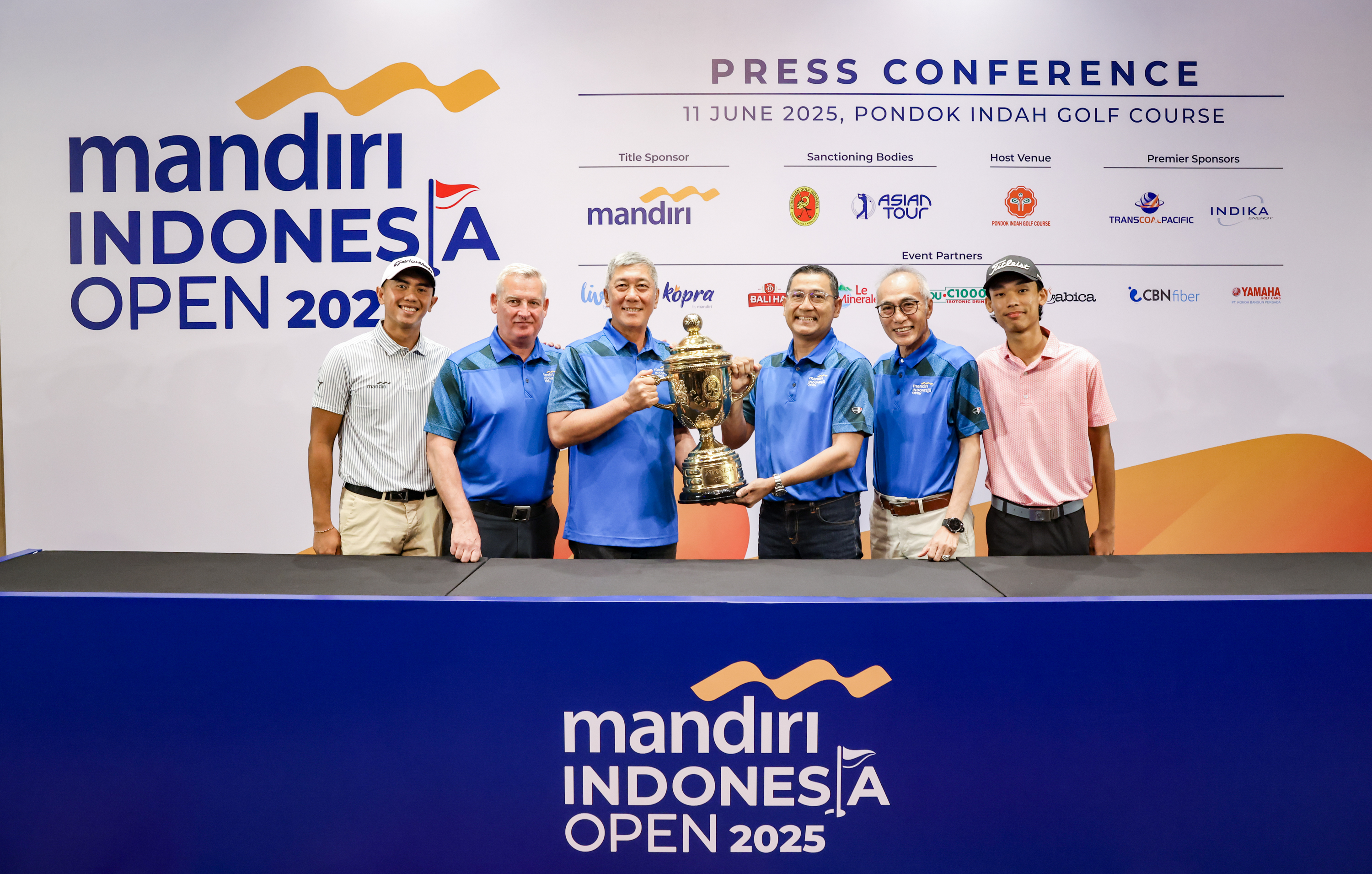

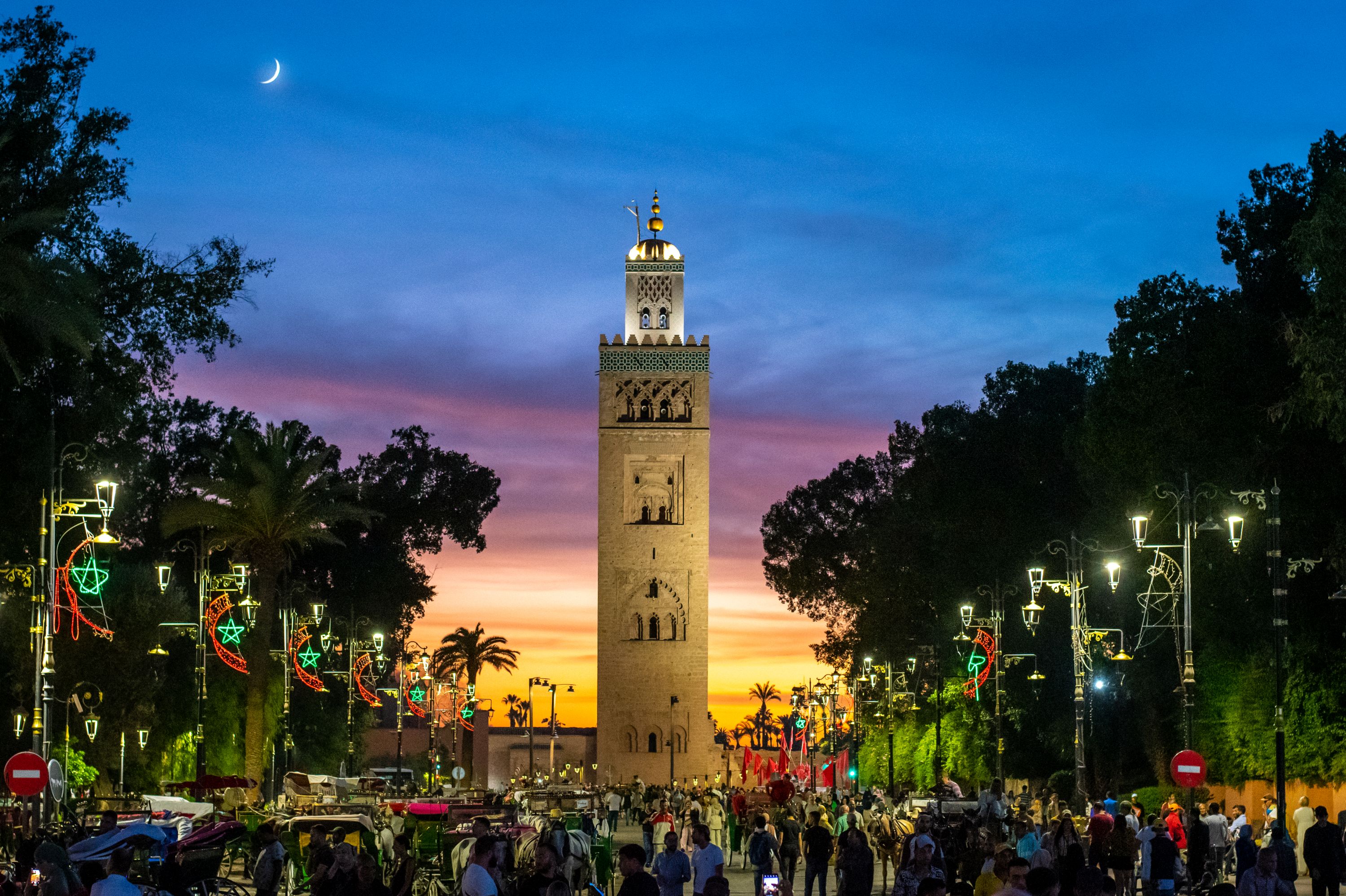

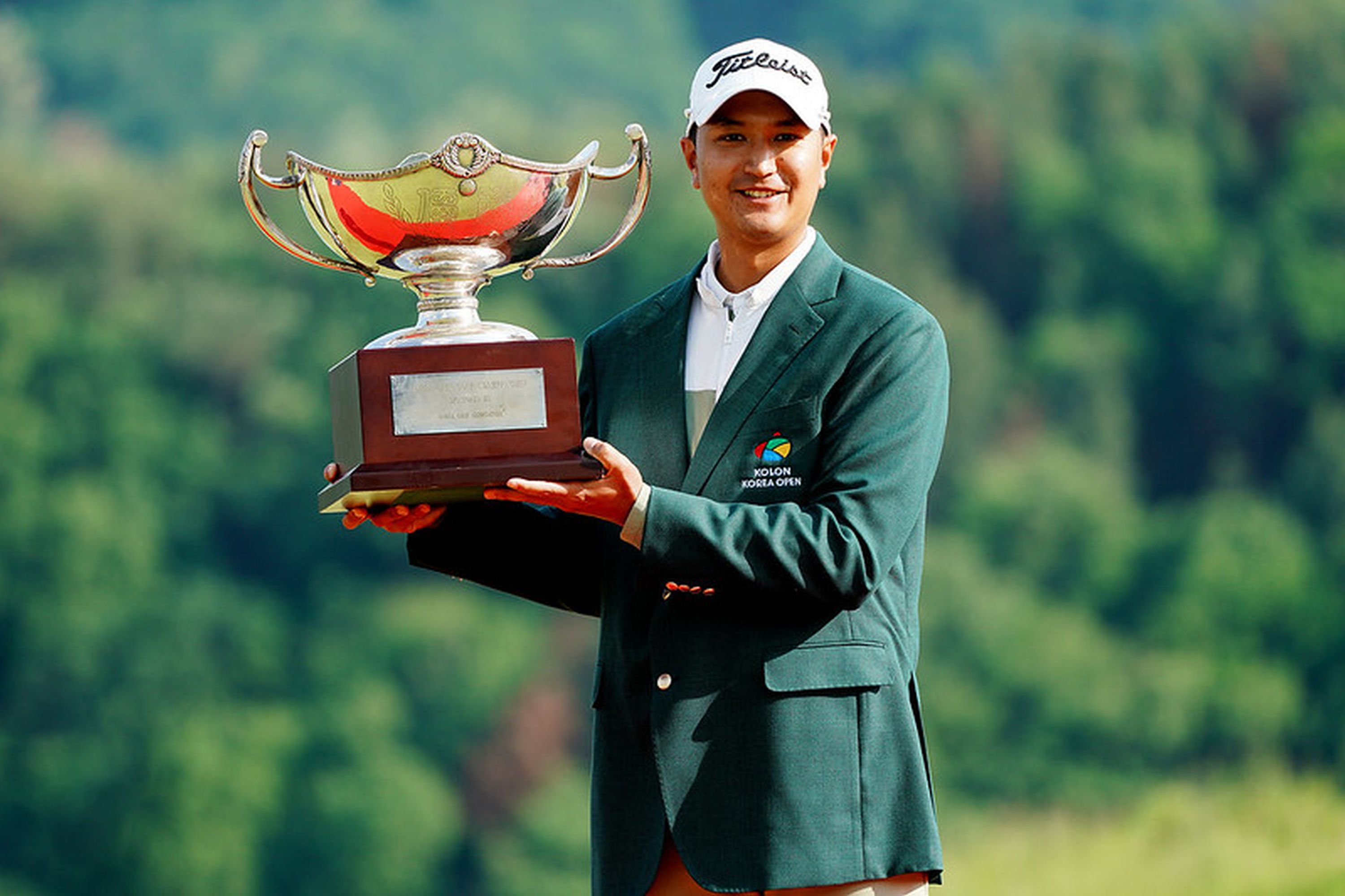
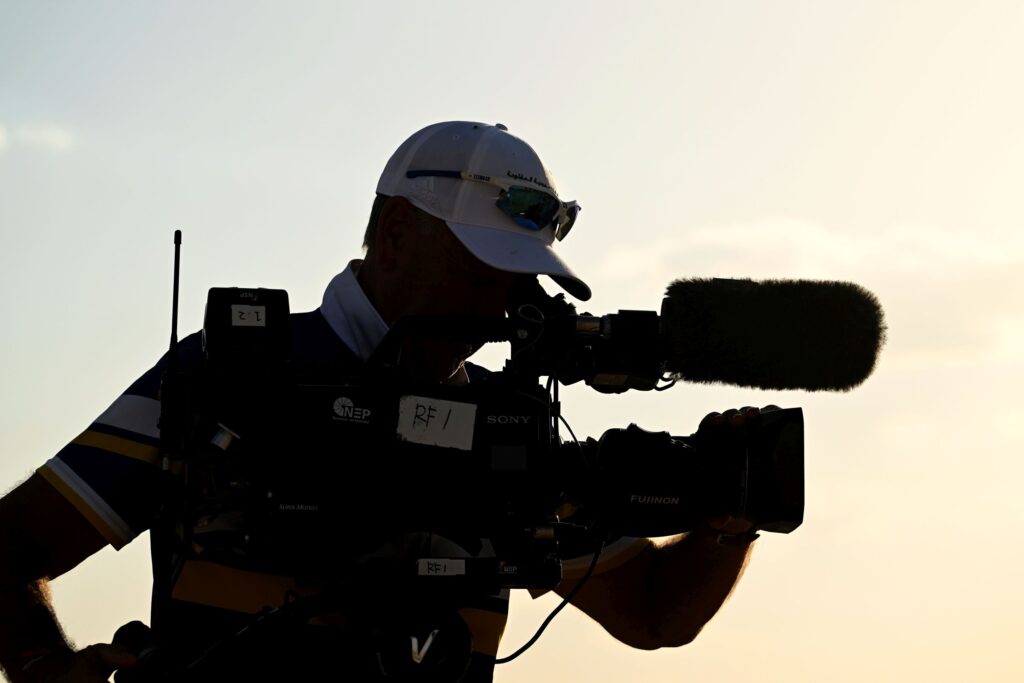
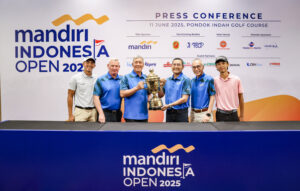



Recent Comments